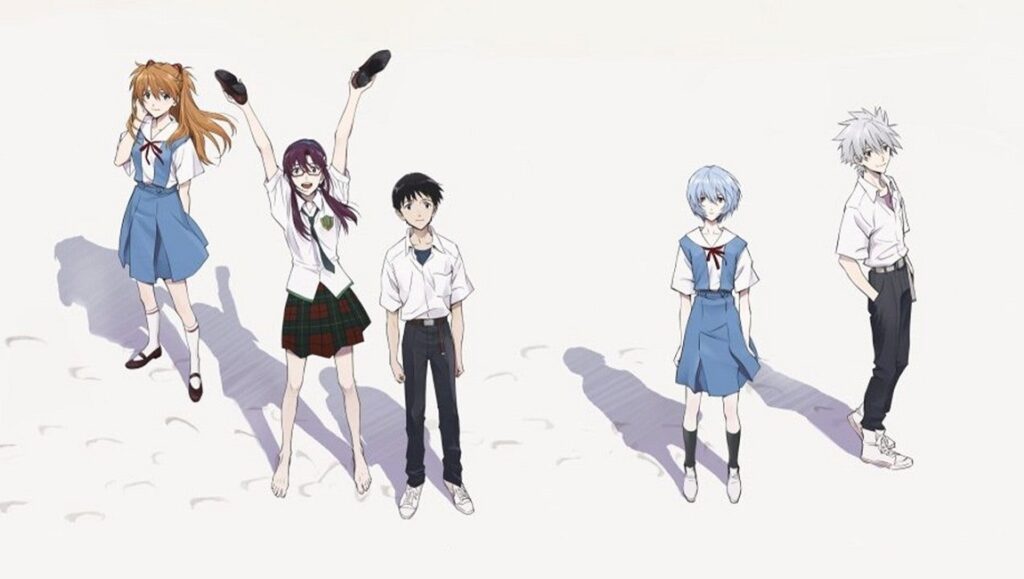Thrice Upon a Time is yet another bold, challenging, pathos-filled apocalyptic plunge into the human psyche.
Hideaki Anno is doing it all over again. No, not in a literal sense: any longtime Evangelion fan knows full well by now how little the animator ever truly repeats himself, even whilst restating and revising the same story he’s told before. That’s why, with each entry in his Rebuild of Evangelion series, he’s strayed further and further from the original source material’s structure, first starting with the relatively faithful 1.0 You Are (Not) Alone, which crammed six whole pensive episodes of the original series into a more digestible, action-oriented bundle — all while sanding down the character’s more complex emotions and discarding the languid pace found in the initial Evangelion — and fully detached at the end of the appropriately titled 2.0 You Can (Not) Advance (suggesting the narrative impossibility of ever truly recreating one’s actions).
Its sequel, 3.0 You Can (Not) Redo, was the wildest swing Anno had yet taken with the franchise in this regard, operating both as a deconstruction of what devotees had come to expect from the series and its beloved characters — playing with fan expectations is a tendency that’s followed the director for most of his career — while also imbuing them with a deeply felt sense of pronounced despair. It articulated some harsh affectual lows, ones not yet explored by the franchise, all caused by Anno updating and expanding upon one of the most neglected emotional throughlines from the show.
Now, after nine long years and several lengthy delays — Anno found time to direct a Godzilla flick during the interim — he’s finishing the Rebuilds (and the franchise as a whole) with a similar vernacular and magnitude found in his previous ambitious ending, 1997’s The End of Evangelion. And while Evangelion: 3.0+1.0 Thrice Upon a Time is every bit the grandiose gesture that film was, one would be hard-pressed to claim that Anno is simply echoing himself once again. The biggest immediate change? A difference of perspective: Anno was 35 when Neon Genesis Evangelion first aired, produced on a compromised budget — one that resulted in a lethargic tempo that was most evident during long, drawn-out conversations, but bred some striking and still iconic images during battle sequences — where the young director poured his heart and soul into every frame. He first closed up shop with all of humanity merging into one collective consciousness (“Congratulations!”), and then when spurred on by vitriolic feedback, pushed his central protagonist Shinji Ikari to the breaking point in the theatrical finish. Now, starting back up about a decade later as something of a worldwide cultural phenomenon, these monetary restrictions are no more. Before, it would often lead to mixed results: there’s a weightlessness to the Eva units now that CG animation is doing most of the heavy lifting, the impression not unlike watching an episode of Power Rangers when these once monstrous beasts launch themselves into the air. By this point in time, however, most of these technical issues have been ironed out: the big set-pieces that open and close the film use this ethereality to their advantage, taking place in air, which allows for some sweeping 360-degree choreography detached from the basic laws of gravity.
But more importantly than these technical aspects, the difference between then (pick a date: the start of the show, the first movie, the start of the Rebuilds) and now comes with Anno’s new outlook on life; or, more specifically, how he feels like ending his life’s work at this current moment in time. A broad objective, for sure, but one of such individual conviction that it only makes sense here. Evangelion, at its core, has always been a property concerned with the self-realization and maturation of protagonist Shinji Ikari in tandem with his creator’s own personal journey of discovery — this has always been his bildungsroman, as he comes to know and accept his internal flaws, recognizing them within his father and vowing to better himself by never running away from his problems again. Anno’s previous jaded outings visualized outcomes that suggest Shinji was too broken to continue existing in a hostile world; this time, Anno allows his tragic hero to follow a different path, one of his own manifestation that ends the cyclical suffering he’s destined to relive over and over again within the overarching narrative of Evangelion as a whole — all of which helps justify the film’s middle hour of relative hoe-hum mundanity as a generous amount of breathing room before this philosophical and visual onslaught.
The degree to which Anno turns the film into yet another intellectually-minded deconstruction — this time, reflecting on the narrativization of one’s life, which is illustrated by us bearing witness to the production of the movie we’re currently watching via unfinished storyboards and the switching of different “sets”; indeed, this is a very audacious, very meta move in a series full of them — will decidedly turn many people off and leave them exasperated to make heads or tails of the signifier-filled ending, one which makes little effort to explain most of what’s just occurred on a logical level (there’s really no point in attempting to do it here either). But for those who have come this far and have remained committed to Anno’s rather insane vision, Thrice Upon a Time is yet another bold, challenging, pathos-filled apocalyptic plunge into the human psyche — and one that features an ending sentiment beautiful enough to never warrant another go around. Congratulations, it seems, are once again in order.
You can currently stream Hideaki Anno’s Evangelion: 3.0+1.0 Thrice Upon a Time on Amazon Prime Video.


Comments are closed.